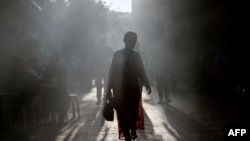In a new report released Monday, Human Rights Watch says the Chinese government continues to impose strict controls on Uyghurs who seek to travel abroad or visit family members living in Xinjiang, measures the New York-based rights organization adds violate their freedom of movement.
While Uyghurs have been allowed to apply for passports and briefly reunite with family members, a slight improvement compared to the widespread confiscation of Uyghurs’ passports since 2016, the “Chinese government continues to deny Uyghurs their right to leave the country, restrict(s) their speech and associations when abroad, and punish(es) them for having foreign ties,” said Yalkun Uluyol, China researcher at Human Rights Watch.
Uluyol told VOA that Beijing uses travel restrictions to maintain control over the Uyghur community at home and abroad and attempts to create “a public image of normalcy” in Xinjiang.
Since 2017, China has put more than a million Uyghurs into internment camps, according to Amnesty International. In 2022, the U.N. high commissioner for human rights said Beijing’s treatment of ethnic minorities in Xinjiang may constitute “crimes against humanity.”
Both the previous Trump administration and the administration of former President Joe Biden have voiced concerns about China's treatment of the Uyghurs and characterized what is happening in Xinjiang as genocide and crimes against humanity.
U.S. Secretary of State Marco Rubio was one of the leading figures in facilitating the passage and enforcement of the Uyghur Forced Labor Prevention Act during his time as a senator.
According to the Human Rights Watch report, Uyghurs in China need to provide detailed information, including their purpose of travel, or personal information of family members abroad, to authorities in Xinjiang.
Those permitted to travel abroad need to avoid engaging in activism and must return to China within a specified time, normally between a few days and several months.
Some Uyghurs said local “authorities had told them that only ‘one person from each family’ can travel at the same time, [while others] said authorities had also required them to provide a ‘guarantor’ before granting them permission to travel,” Human Rights Watch said in the report, adding that failure to comply with restrictions could result in harsh punishments against their family members or guarantors.
During trips, Uyghurs must check in with a designated official in China regularly, and upon their return, authorities will confiscate their passports.
“Officials from the neighborhood committee, the local police station, and the public security bureau visited my father after his return. They asked about whom he met, where he went, and what he told people,” an unnamed Uyghur told Human Rights Watch.
Government-organized trips to Xinjiang
In addition to maintaining strict control on Uyghurs seeking to travel abroad, the Chinese government also imposes strict conditions on Uyghurs in the diaspora who want to reunite with family members in Xinjiang.
According to the report, Uyghurs with foreign passports need to go through stringent vetting processes to obtain approval from local authorities in Xinjiang. Once they are in China, these Uyghurs are subject to repeated questioning and are only allowed to stay at hotels rather than their relatives’ homes.
In some cases, Chinese embassies will tell some Uyghurs abroad to participate in official tours to Xinjiang organized by the local Communist Party propaganda department.
Abduweli Ayup, a Uyghur linguist and activist based in Norway, said Chinese embassies in countries like Turkey, Kazakhstan and Kyrgyzstan have organized these group tours through Chinese immigrant associations in those countries since 2019.
“Four Chinese immigrant associations were competing to organize these propaganda tours in Turkey,” he told VOA by phone.
Before traveling to China, the report said Uyghurs need to provide copies of personal identification and detailed personal information. Once they are in Xinjiang, local authorities will closely monitor them and maintain strict restrictions on them.
Uyghurs on these tours “said they had to seek permission to visit their families and [had] to speak Mandarin Chinese, even among themselves,” Human Rights Watch said in the report.
Apart from the strict conditions, Uyghurs visiting Xinjiang will be asked by local authorities to “take part in propaganda activities,” including praising the Communist Party for its Xinjiang policies.
“I realized everything was orchestrated, the tour was closely surveilled by police, and I had to ask for permission from the neighborhood committee and the local police to stay with my family after the tour,” one unnamed Uyghur told Human Rights Watch.
Uluyol said the Chinese government uses these highly restricted trips to Xinjiang to maintain control over Uyghurs in the diaspora community. The Uyghur diaspora begins to “self-censor while stopping engaging in peaceful political activism or sending their children to Uyghur schools,” he told VOA by phone.
He said the Chinese government’s approach, which is a form of transnational repression, “creates a distrust in the diaspora community” and may lead to the further fragmentation of the community.
In response to inquiries from VOA, the Chinese Embassy in Washington, D.C., said, “Xinjiang has never restricted the freedom of travel of people of all ethnic groups, including the Uyghurs.”
“In Xinjiang, people of all ethnic groups are free to enter and leave the country, as long as they are not restricted from leaving the country for suspected crimes,” said Liu Pengyu, the spokesperson of the Chinese Embassy, adding that people of all ethnic groups, including Uyghurs, are allowed to communicate with relatives overseas.
Since 2022, the Chinese government has organized several trips to Xinjiang for representatives from foreign countries.
During a trip attended by delegates from several Islamic countries in October 2024, Chinese state newspaper China Daily claimed the foreign guests expressed “their admiration for the social stability, harmony, and collaborative development” among ethnic groups in Xinjiang.
Since China is likely to maintain the travel restrictions on Uyghurs, Uluyol said foreign countries should “protect citizens and residents” from threats posed by Beijing while international bodies like the United Nations should try to prioritize these challenges and address them at the international level.






